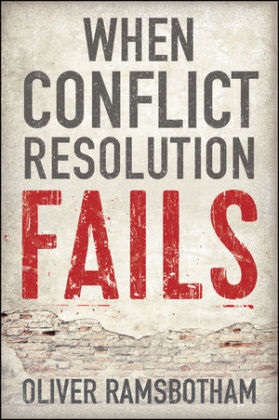Read more
Bringing warring parties to the negotiating table is the aim of any peace process. But what happens when those negotiations falter and conflict resolution fails? Is everything lost or are there prospects for meaningful change in even the most intractable of conflicts?
In this insightful book, leading scholar-practitioner in conflict resolution Oliver Ramsbotham explores the phenomenon of radical disagreement as the main impediment to negotiation, problem solving and dialogue between conflict parties. Taking as his focus the long-running and seemingly irresolvable conflict between Israel and Palestine, he shows how what is needed in these circumstances is not less radical disagreement, but more. Only by understanding what is blocking the way and by promoting collective strategic engagement within, across and between the groups involved, can deadlock be transformed.
Rich in detail and accessibly written, this book introduces a new and as yet relatively unexplored frontier in conflict studies. Its wider application to other phases, levels and war zones holds out rich promise for extending conflict engagement in some of the world's deadliest and most difficult hot spots.
List of contents
PART I ARGUMENT
CHAPTER 1 LESSONS FROM THE FRONTIERS OF FAILURE
Conflict Resolution and Second Order Social Learning
CHAPTER 2 CONFLICT RESOLUTON AND ITS ENEMIES
The World in 2015: Trends in global violence
CHAPTER 3 WHY CONFLICT RESOLUTION FAILS
Linguistic intractability and radical disagreement
CHAPTER 4 AN ALTERNATIVE TO NEGOTIATION AND DIALOGUE
Engaging radical disagreement in intractable conflict
PART II CASE STUDY
CHAPTER 5 STRATEGIC THINKING FOR POSSESSORS
Why should Israel give up anything?
CHAPTER 6 STRATEGIC THINKING FOR CHALLENGERS
How can Palestinians transform the status quo?
CHAPTER 7 STRATEGIC ENGAGEMENT
The Israeli Strategic Forum, the Palestine Strategy Group, and the Palestinian Citizens Of Israel Group
CHAPTER 8 STRATEGIC THINKING FOR THIRD PARTIES
Principled Negotiation, Strategic Negotiation and the Kerry Initiative
PART III IMPLICATIONS
CHAPTER 9 EXTENDED CONFLICT RESOLUTION
Other phases, other levels, other conflicts
CHAPTER 10 EXPLORING RADICAL DISAGREEMENT
Taking agonistic dialogue seriously
CHAPTER 11 UNDERSTANDING RADICAL DISAGREEMENT
Is there a theory of radical disagreement?
CHAPTER 12 LIVING WITH RADICAL DISAGREEMENT
Facing an agonistic future
About the author
Oliver Ramsbotham is Emeritus Professor of Conflict Resolution at the University of Bradford and President of the Conflict Research Society. He is co-author of the bestselling and hugely popular survey of the field
Contemporary Conflict Resolution, now in its fourth edition.
Summary
Bringing warring parties to the negotiating table is the aim of any peace process.
Report
'This well-informed and nuanced analysis offers one of the most incisive treatments of the Israel/Palestine conflict available. Among books in the field, there is really nothing quite like it.'
Alan Dowty, University of Notre Dame
'When Conflict Resolution Fails extends Ramsbotham's groundbreaking work on "radical disagreement". Using the Israeli-Palestinian conflict as its main case, it describes a form of "extended conflict resolution", built around ideas and practices of "strategic engagement", that challenges our understanding of the role of third parties and proposes what may be, ethically, the outer limits of conflict resolution itself. An important and necessarily sobering book.'
Kevin Avruch, George Mason University

